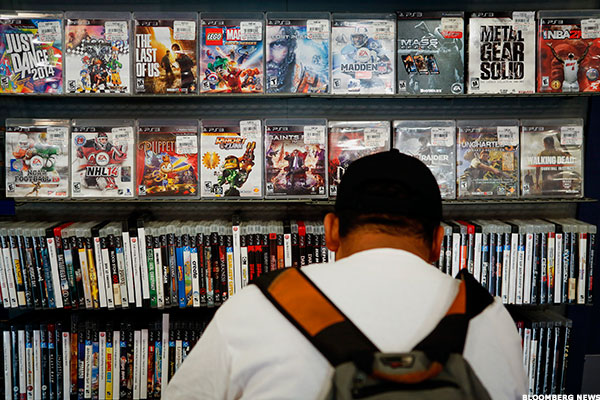A technology expert told TheStreet in early March that it's the beginning of the end for packaged video games. Its customer base is leaving in droves from it and other companies that sell in-store video games, in favor of online outlets, and that tide is highly unlikely to turn back.
But that may not soothe the pain of investors, who saw GameStop shares crash 12% to $21.01 on Friday. The video game retailer earned $2.38 a share in the fiscal fourth quarter of 2017, which ended in January, which exceeded analyst expectations for $2.28 a share. Same-store sales dived 16.3%. Revenue plummeted 13% year over year to $3.05 billion, and fell short of the consensus analyst estimate.
"2016 proved to be a more difficult year than we originally forecast, while our strategic transformation drove record gross margins of 35% and earnings came in within our revised guidance of $3.77 a share, we encountered stiff headwinds as we completed the third year of the console cycle," said CEO Paul Raines during an earnings call Thursday. "As a result, the physical games category declined 15% and our GameStop brand lost a small amount of market share during the holiday period due to deep discounting."
For the year ahead, the company sees earnings of $3.10 to $3.40 a share, far short of analysts estimates for $3.70 a share. At the same time, revenue is expected to be in the range of $8.44 billion to $8.78 billion, which falls between a 2% decline to 2% growth over the previous year.
GameStop isn't a alone in having trouble selling video games. Its competitor Best Buy (BBY - Get Report) noted in its latest earnings report that video game sales were down.

A kid buying video games
"We expected some decline in gaming sales heading into the quarter, but the level of industry softness across both gaming hardware and software was much steeper than anticipated," said Best Buy Chairman and CEO Hubert Joly on a conference call.
"We're seeing more games being sold digitally, as 25% of the games are sold as full-game download. Full-game downloads are increasing by 5% to 10% points per year," Piper Jaffray analyst Michael Olson told TheStreet in early March. He said then that he has seen the amount of packaged games sold at stores drop in the last three years.
Olson said the trend is being fueled by convenience for the consumer and accelerated by faster internet speeds and greater storage capacity on gaming consoles. And that change is very good news for games publishers such as Electronic Arts (EA - Get Report) and Activision Blizzard (ATVI - Get Report) as well as video game console makers, because the newer landscape is much more lucrative: profit margins on sales of a packaged game are 60% versus 80% on a full-game download.
Both Microsoft (MSFT - Get Report) and Sony (SNE - Get Report) have introduced the Xbox One and PlayStation 4, respectively, which feature video game subscriptions, but for now their offerings aren't as current as gamers would like, said Olson. He expects the companies to offer more popular games over time.
"Eventually, we expect all games will be 100% download and streaming," he added. He said also that retailers who may be missing sales of packaged video games, "can benefit from the retail sales of the consoles."
Microsoft recently took a big step toward that digital download only environment. The company hatched a program where Xbox One owners can pay $10 per month to have unlimited access to over 100 Xbox One and backward-compatible Xbox 360 games. The news sent shares of GameStop into free-fall at the time.
To be sure, packaged games, both at GameStop and Best Buy, have their days numbered.
No comments :
Post a Comment